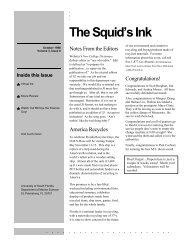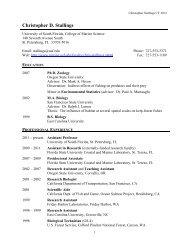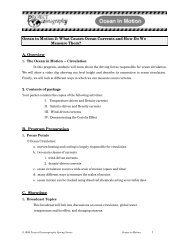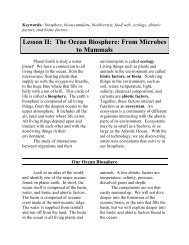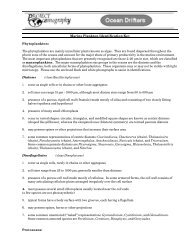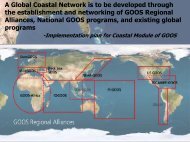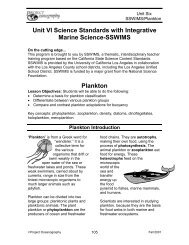Climate change futures: health, ecological and economic dimensions
Climate change futures: health, ecological and economic dimensions
Climate change futures: health, ecological and economic dimensions
You also want an ePaper? Increase the reach of your titles
YUMPU automatically turns print PDFs into web optimized ePapers that Google loves.
110 | FINANCIAL IMPLICATIONS<br />
BRETTON WOODS<br />
1944: WHAT<br />
COMES NEXT?<br />
With Europe in shambles after two world wars <strong>and</strong> the<br />
Great Depression, world leaders gathered in 1944 at<br />
the Bretton Woods conference center in the White<br />
Mountains of New Hampshire to plot out a new world<br />
order. New rules, incentives <strong>and</strong> institutions were<br />
needed. The League of Nations established in Paris in<br />
1919 after World War I had been inadequate to prevent<br />
subsequent global conflict. Under the leadership<br />
of Sir John Maynard Keynes, the delegates crafted a<br />
new development paradigm.<br />
Three new rules were agreed upon:<br />
1. Free trade in goods.<br />
2. Constrained trade in capital.<br />
3. Fixed ex<strong>change</strong> rates.<br />
New institutions were established:<br />
1. The International Bank for Reconstruction <strong>and</strong><br />
Development (The World Bank).<br />
2. The International Monetary Fund.<br />
In the same period, Eleanor Roosevelt shepherded in<br />
the Universal Declaration of Human Rights setting new<br />
st<strong>and</strong>ards <strong>and</strong> goals, <strong>and</strong> the United Nations was<br />
formed.<br />
The financial incentives that followed proved to be the<br />
necessary component.<br />
With loans from international financial institutions to<br />
purchase oil <strong>and</strong> fund huge hydropower schemes (that<br />
unknowingly spread diseases, such as malaria <strong>and</strong><br />
snail-borne schistosomiasis), many nations slipped<br />
deeper into debt <strong>and</strong> cleared forests to plant crops to<br />
export food to meet debt payments. The projected<br />
“epidemiological transition” associated with development<br />
— from tropical diseases <strong>and</strong> malnutrition to the<br />
ills more prevalent in developed nations (such as heart<br />
disease, diabetes <strong>and</strong> cancer) — failed to occur for<br />
most sectors of the developing world.<br />
By 1983, the lines had crossed: More money was<br />
flowing out of the developing world than was flowing<br />
in, <strong>and</strong> the debt crisis, rising inflation <strong>and</strong> belt-tightening<br />
conditions placed on subsequent loans undermined<br />
public sectors <strong>and</strong> weakened many nation states.<br />
In the 1990s growth in information technology in<br />
developed nations skyrocketed, as did the speculative<br />
trade in currencies. (Currency transactions went from<br />
US $18 billion a day in 1972 to US $1.9 trillion<br />
daily today.) Then the market bubble burst.<br />
••••<br />
Will today’s confluence of environmental, energy <strong>and</strong><br />
<strong>economic</strong> crises lead to a conscious restructuring of<br />
development priorities? One hundred <strong>and</strong> fifty years<br />
ago urban epidemics of cholera, TB <strong>and</strong> smallpox<br />
drove environmental reform, modern sanitation <strong>and</strong> the<br />
creation of clean water systems. Will public <strong>health</strong><br />
<strong>and</strong> well being resume their center-stage roles as the<br />
drivers for development? With laissez-faire we risk collapse<br />
or, worse, an authoritarian response to scarcity<br />
<strong>and</strong> conflict. The alternative is a future rich with innovation<br />
<strong>and</strong> sustained, <strong>health</strong>y growth.<br />
The Marshall Plan provided funds to rebuild Europe<br />
<strong>and</strong> regenerate robust trading partners. In the US, the<br />
GI Bill stimulated housing construction, new colleges,<br />
job training <strong>and</strong> jobs that combined to prime sustained<br />
growth in the post-war period.<br />
In 1972, however, the Bretton Woods rules came<br />
undone. Mounting outlays for the Vietnam War<br />
strained US fiscal balances, precipitating the ab<strong>and</strong>onment<br />
of the second <strong>and</strong> third rules: Capital as well as<br />
goods could now be moved freely <strong>and</strong> currencies<br />
were allowed to float. The result was that, following<br />
the OPEC oil embargo, oil prices increased tenfold<br />
from US $3 a barrel to US $30, <strong>and</strong> gold shot up<br />
from US $38 to over US $600. Save for nations<br />
endowed with “black” or yellow gold, numerous<br />
nations dependent on oil to power their farms, industries<br />
<strong>and</strong> transport became bankrupt.<br />
How we develop <strong>and</strong> how we power that development<br />
are the pivotal decisions. Making the decisions<br />
democratically will mean including stakeholders that<br />
were not included in Bretton Woods — women, civil<br />
society <strong>and</strong> developing nations. Finance — with its<br />
globally diversified portfolio, monetary instruments <strong>and</strong><br />
political influence — has a unique role to play in this<br />
transition. Having appreciated the long-term trajectory<br />
of exp<strong>and</strong>ing risk profiles, the financial services sector,<br />
with civil society <strong>and</strong> the United Nations, can convene<br />
the discussions to how best construct the scaffolding<br />
for a more stable <strong>and</strong> sustainably productive future<br />
(Epstein <strong>and</strong> Guest 2005).



